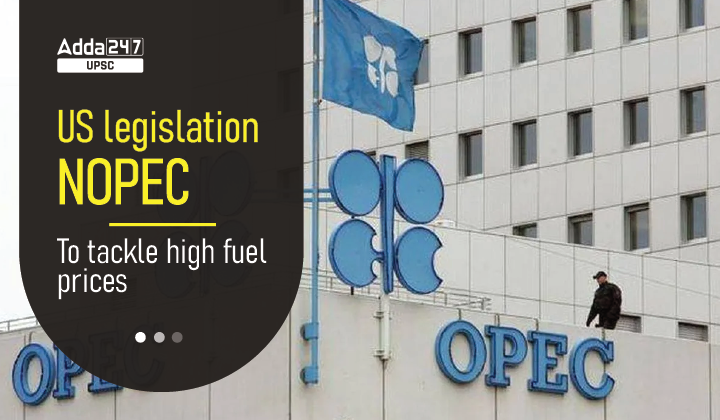Table of Contents
US legislation NOPEC- To tackle high fuel prices: Relevance for UPSC Exam
General Studies III- Infrastructure: Energy, Ports, Roads, Airports, Railways Etc.
US legislation NOPEC- To tackle high fuel prices: Context
US legislation NOPEC which could open members of oil producing group OPEC+ to antitrust lawsuits has emerged as a possible tool to tackle high fuel prices.
What is US legislation NOPEC?
- NOPEC stands for No Oil Producing and Exporting Cartels (NOPEC).
- It is a bill to protect US consumers and businesses from engineered oil spikes.
- But some analysts warn that implementing it could also have some dangerous unintended consequences.
US legislation NOPEC: Need
- OPEC+, which groups the Organization of the Petroleum Exporting Countries (OPEC) and allies including Russia, agreed to steep production cuts, curbing supply in an already tight market.
- After the decision, the US decided to reduce the group’s control over energy prices.
US legislation NOPEC: Key features
- The bipartisan NOPEC bill would tweak US antitrust law to revoke the sovereign immunity that has protected OPEC+ members and their national oil companies from lawsuits.
- If signed into law, the US attorney general would gain the option to sue the oil cartel or its members, such as Saudi Arabia, in federal court.
- It is unclear exactly how a federal court could enforce judicial antitrust decisions against a foreign nation.
US legislation NOPEC: Historical Background
- Previous versions of the NOPEC bill have failed amid resistance by oil industry groups, including the top US oil lobby groups.
- Saudi Arabia has rebuffed repeated lobbying during visits by Biden officials not to cut production.
- Instead, OPEC+ has agreed to cut output by the most since the start of the COVID-19 pandemic.
US legislation NOPEC: Implications
- NOPEC more or less is a knee-jerk reaction from the US against oil hegemony of the OPEC+.
- If passed into law, it could lead to unintended blowback.
- In 2019, for example, Saudi Arabia threatened to sell its oil in currencies other than the dollar if Washington passed a version of the NOPEC bill.
- There is a possibility that other countries could take similar action on the US for withholding agricultural output to support domestic farming, for example.




 TSPSC Group 1 Question Paper 2024, Downl...
TSPSC Group 1 Question Paper 2024, Downl...
 TSPSC Group 1 Answer key 2024 Out, Downl...
TSPSC Group 1 Answer key 2024 Out, Downl...
 UPSC Prelims 2024 Question Paper, Downlo...
UPSC Prelims 2024 Question Paper, Downlo...





